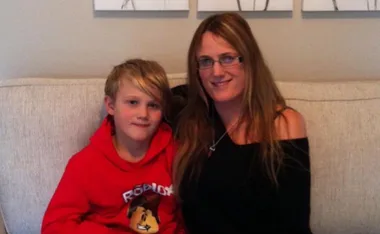Exclusive extract from Anybody out there? By Marian Keyes.
I used to dream of a white wedding.
The kind of dream where you jerk awake in the middle of the night, drenched in sweat, your head pounding. A dream in the worst nightmare kind of way.
I could see it all. The months of bickering with my mother over broccoli. On the day itself, trying to fight a path through my sisters — all of them my bridesmaids — to get space in a mirror to put my make-up on, and having to talk Helen out of wearing my dress. Then Dad walking me up the aisle muttering, ‘I feel a right gom in this waistcoat,’ and at the ‘giving me away’ point, saying, ‘Here you can have her. You’re bloody well welcome to her.’
But there’s nothing like a near-death experience to bring things into focus.
After I’d recovered from my scuba-diving ascent — I had to spend time in a decompression thing, then a much longer time accepting co-dependent’s abject apologies; clearly the whole incident had set him back terribly, I’d never met anyone so needy — I rang my mother to thank her for giving birth to me and she said, ‘What choice had I? You were in there, how else were you going to get out?’ Then I told her I was getting married.
‘Sure you are.’
‘No, Mum, I really am. Wait, I’m going to put him on the line.’
I handed Aidan the phone and he looked terrified.
‘What do I say?’
‘Tell her you want to marry me.’
‘Okay. Hello, Mrs Walsh. Can I marry your daughter?’ He listened for a moment then gave me back the phone.
‘She wants to talk to you.’
‘Well, Mum?’
‘What’s wrong with him?’
‘Nothing.’
‘Nothing obvious, you mean. Has he a job?’
‘Yes.’
‘A chemical dependency?’
‘No.’
‘Cripes, this is a break from tradition. What’s his name?’
“Aidan Maddox.’
‘Irish?’
‘No, Irish—American. He’s from Boston.’
‘Like JFK?’
‘Like JFK,’ I agreed. Her lot loved JFK, he was up there with the Pope.
‘Well look what happened to him.’
Petulantly, I said to Aidan, ‘My mother won’t let me marry you in case you get your head blown off in an open-top car in a Dallas cavalcade.’
‘Hold your horses,’ Mum said, ‘I never said that. But this is very sudden. And your history of … ah … impulsive carry-on is a long one. And how come you never mentioned him at Christmas?’
“I did. I said I had a boyfriend who kept asking me to marry him, but Helen was doing her impersonation of Stephen Hawkings eating a cone and no one was listening to me. As usual. Look, ring Rachel. She’s met him. She’ll vouch for him.’
A pause. A sneaky pause.
‘Has Luke met him?’
‘Yes’
‘I’ll ask Luke about him.’
‘Do that.’
‘Are we really getting married?’ I asked Aidan.
‘Sure.’
‘Then let’s do it soon,’ I said, ‘Three months’ time. Start of April?’
‘Okay.’
In the New York dating rules, after a relationship ‘goes exclusive’, the next step is to get engaged. This is meant to happen after three months. Basically, the minute the period of exclusivity starts, the women set a stopwatch and as soon as the ninety—day period brrrrings, they shout, ‘Right! Time’s up! Where’s my ring?’
But Aidan and I broke all records. A two—month period between going exclusive and getting engaged and three months between getting engaged and getting married. And I wasn’t even pregnant.
But after my brush with death beneath the waves, I was full of vim and vigour and there seemed to be no point in waiting for anything. My urgent need to do everything right now passed after a couple of weeks, but at the time I was going round seizing the day left, right and centre.
‘Where will we do it?’ Aidan asked. ‘New York? Dublin? Boston?’
‘None of the above,’ I said, ‘Let’s go to County Clare. West coast of Ireland. We went there for our holidays every summer. My dad’s from there. It’s lovely.’
‘Okay. Is there a hotel? Give them a call.’
So I rang the local hotel in Knockavoy and my stomach flipped alarmingly when they said they could fit us in. I hung up the phone and backed away.
‘Christ,’ I said to Aidan, ‘I’ve just booked our wedding. I might have to varmint.’
Then everything happened very fast. I decided to leave the menu to Mum because of the great broccoli-wars of Claire’s wedding. (A bitter stand-off that lasted almost a week with Mum saying that broccoli was ‘pretentious’ and nothing more than a ‘jumped-up cauliflower’ and Claire shrieking that if she couldn’t have her favourite vegetable at her wedding, when could she have it?) The way I saw it, the food is always revolting at weddings, so why argue over whether your guests should have the disgusting broccoli or inedible cauliflower?
‘Work away, Mum, ‘I said magnanimously, ‘The catering is your area.’
But mindfields lay in the most innocent-looking of landscapes — I made the mistake of suggesting that we should have a vegetarian option and that set her off: she didn’t believe in vegetarianism. She insisted it was a whim and that people were only doing it to be deliberately awkward.
‘Grand, grand, whatever,’ I said, ‘They can eat the bread rolls.’
I was far, far more worried about the bridesmaid issue. I really felt I couldn’t cope with all four of my sisters arguing over colour and style and shoes. But in a fantastic stroke of luck, Helen refused to be one because of that superstition that if you’re a bridesmaid more than twice you’ll never be a bride.
‘Not that I’m planning anything,’ she said, ‘but I want to keep my options open.’
Once Mum heard that, she forbade Rachel from being a bridesmaid because that would put the kibosh of her ever marrying Luke, then after a big summit, it was decreed that I would have no bridesmaids but that Claire’s three children would be flower girls. Even Luka, her son.
Then there was the dress. I had vision in my head of what I wanted — a bias-cut satin sheath — but couldn’t find it anywhere. In the end it was designed and made by a contact of Dana’s, a woman who ordinarily made curtains.
‘I can see the headlines now,’ Aidan said, ‘New York Bride in non-Vera Wang Dress Shocker.’
And, of course, there was the invitation list.
‘Okay with you if I invite Janie?’ Aidan asked.
It was a tricky one. Naturally, I didn’t want her in there if her heart was broken, and if, at the ‘Does anyone object?’ bit, she was going to jump to her feet and screech, ‘IT SHOULDA BEEN ME!’
But it would be nice if we could meet and be civilised.
‘Sure. You’ve gotta invite her.’
So he did, but we got a nice letter back, thanking us for the invitation, but saying that she wouldn’t be able to attend.
I didn’t know wether I felt relieved or not. Anyway she wasn’t coming and that was that.
But it wasn’t.
Newsletter conversion description. Get the latest in your inbox.
























.png?resize=380%2C285)
.jpg?resize=380%2C285)




.png?resize=380%2C285)




































